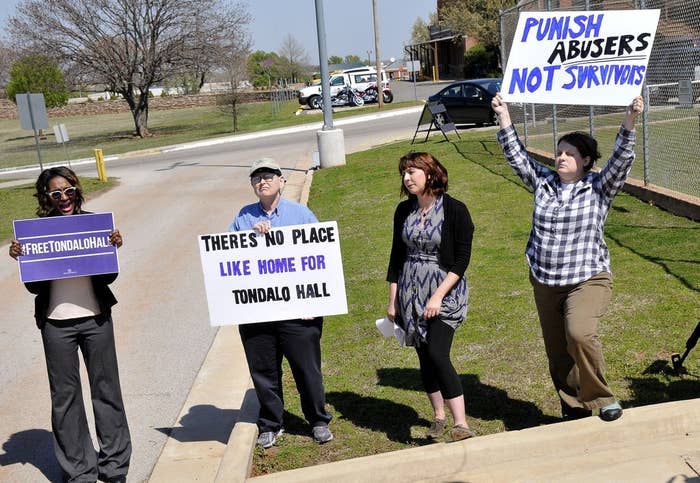
A small but passionate group, holding signs saying "Punish Abusers, Not Survivors," and "There's No Place Like Home For Tondalo Hall," demonstrated outside of Oklahoma's Pardon and Parole Board on Monday.
The dozen or so demonstrators were demanding the release of Hall, who is serving a 30-year sentence for failing to protect her children from her boyfriend — despite evidence that the boyfriend violently abused Hall, too.
The boyfriend, Robert Braxton Jr., admitted to breaking the leg and ribs of their 3-month-old daughter, and received a 2-year sentence. He has been free for the past eight years. Prosecutors did not accuse Hall of any abuse, but she has been in jail for a decade.
The small group of protesters chanted for Hall to receive "justice" and for her to be free. They gathered at the behest of UltraViolet, a women's rights organization that took up Hall's cause last fall. The group has circulated a petition that has garnered more than 70,000 signatures.
A BuzzFeed News investigation found that Hall is one of at least 28 mothers in 11 states who has been sentenced to 10 years or more in prison for failing to protect their children from their violent partners, despite evidence the mothers themselves were violently abused.
Hall has 20 years left on her sentence, but she has submitted an application for clemency to the Oklahoma Pardon and Parole Board. The board gathered for its monthly meeting on Monday. Hall's case is not on the docket, and there is no word yet as to when the board will hear her case. Kylie Shelley, a local organizer in Oklahoma City, said the group would gather again — with greater numbers — once they receive notification of when Hall's case will be heard.
Shelley said she joined the protest because the sentence disparity made her angry. "What would compel a judge to sentence someone to 30 years and sentence the other person to 2 years was really confusing to me," she said.
